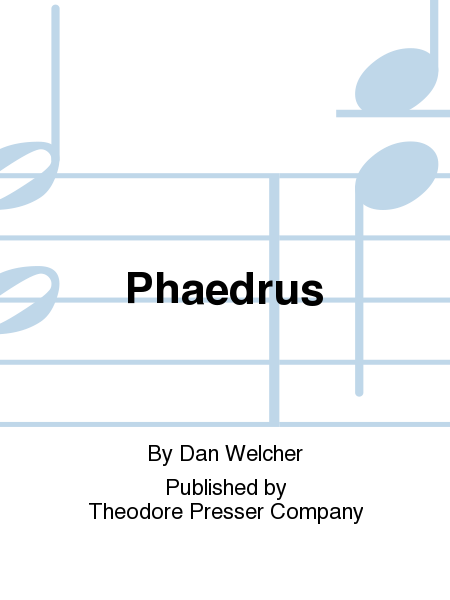Details
Description
SKU: PR.164002390
Composed by Dan Welcher. Set of Score and Parts. With Standard notation. Composed 1995. 26+14+14 pages. Duration 14 minutes. Theodore Presser Company #164-00239. Published by Theodore Presser Company (PR.164002390).UPC: 680160038091.
I became interested in the work of Plato through my friend and collaborator, the writer and philosopher Paul Woodruff. Paul's new translation, with Alexander Nehamas, of the Symposium gave me insights into ancient Greek ways of thinking about Love, Beauty, and Wisdom -- and managed to keep the earthy, and often bawdy side of it all in full view. But their new translation of Plato's later dialogue Phaedrus went even further: the beauty of the speeches is breathtaking, and the discourse itself is enough to keep one awake at night. Basically the Great Speech of Socrates in the Phaedrus dialogue has to do with the place of Eros in the world, and with the conflict in the soul between fleshly pleasure and philosophic discovery. I will not attempt to encapsulate this brilliant discourse in a program note: suffice it to say that reading it gave rise to my two-sided work for clarinet, violin, and piano, Phaedrus. The first movement represents the Philosophic life, and is thus subtitled Apollo's Lyre (Invocation and Hymn). It begins with an unaccompanied melody for the clarinet, which (after a pair of harp-like flourishes for the piano, expands into an accompanied canon. The voices in the dialogue (clarinet and violin) follow each other by a prescribed number of beats, but the music is totally devoid of any meter at all. The piano, representing the lyre, accompanies this lyric love-feast with repeated strummed chords. The canon has three large sections, and ends with violin echoing the unaccompanied clarinet invocation as the sound of the lyre fades. The second movement, called Dionysus' Dream-Orgy (Ritual Dance) presents, after a brief introduction, another kind of unmetered music. Rather than long lyric flights of philosophic song, however, this time we hear a unison dance of unbridled energy and sensual transport. The piece soon forms itself into a loose arch form, with contrasting metered dance sections divided by the unison unmetered orgy tune. Midway through the movement, Apollo's melody returns from the first movement, but it is a temporary reminiscence. The orgiastic dance returns, reaches a climax, and ends with a stomping of feet. While Plato asserts that a proper balance between lust and reason is necessary in all men, he (naturally) gives the nod to Philosophy as the better choice in which to live. Not so in my music: the two sides are meant to coexist and to complement each other. No sides are taken. Phaedrus was commissioned of the Verdehr Trio by Michigan State University. It is dedicated to the Vedehr Trio with great affection and admiration.

 Share
Share